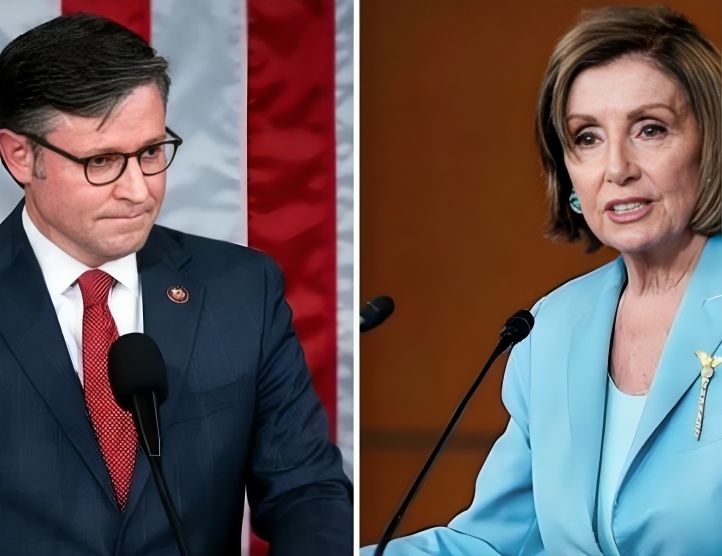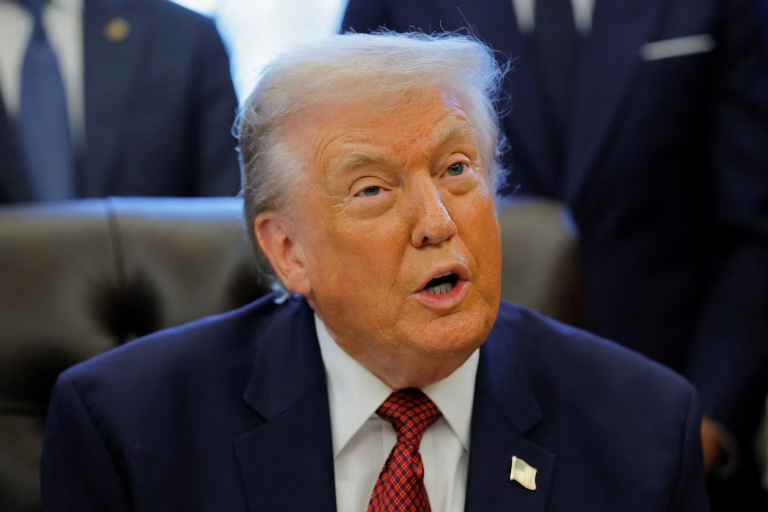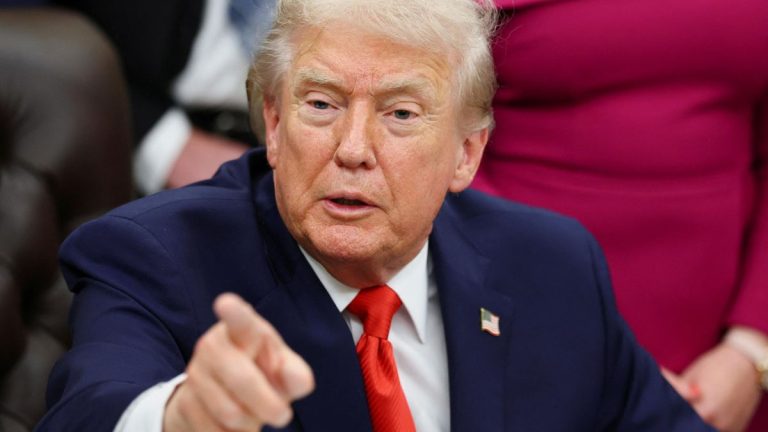Johnson Says He’s Following ‘Pelosi Precedent’ In Not Swearing In New Dem
House Speaker Mike Johnson (R-La.) defended his decision to delay the swearing-in of Rep.-elect Adelita Grijalva (D-Ariz.), arguing that he’s acting fully within congressional norms established by his Democratic predecessor, Nancy Pelosi.
Johnson’s remarks came during an interview with Fox Business host Cheryl Casone, where he addressed criticism from Democratic leaders and social media speculation that the delay was politically motivated or linked to the recent release of the Epstein files — an allegation he flatly dismissed.
‘I’m Following the Pelosi Precedent’
“Of course, we’re going to give her the oath as soon as we return to legislative session,” Johnson said. “That is the rule of the House. I am following the Pelosi precedent.”
Johnson cited several examples during Pelosi’s tenure as Speaker when newly elected members were not sworn in immediately after winning special elections.
“My good friend Julia Letlow, who was elected to fill the seat of her late husband who passed away because of COVID, won that special election in very similar circumstances to Rep.-elect Grijalva,” Johnson explained. “Nancy Pelosi administered the oath to her 25 days after she won that seat.”
Johnson added that Pelosi delayed the swearing-in of Democrats Pat Ryan and Joe Sempolinski for more than three weeks after their August recess elections.
“She waited, logically, until the next legislative day to do that,” he said. “I am doing the exact same thing.”
Addressing the Epstein File Rumors
Johnson also pushed back against claims circulating online that his decision was related to the recent release of thousands of pages of Jeffrey Epstein–related documents, including flight logs and financial ledgers.
“This has zero to do with Epstein,” Johnson clarified. “The Epstein files are being released — there are 43,000 pages now out there. You have the flight logs, the financial ledgers, the phone logs, and the daily calendar of Epstein. Names are being released. All that is happening. So that’s a red herring.”
He accused Democrats of using the controversy as a “distraction tactic” to deflect from their own role in the ongoing government shutdown.
“The Democrats are so good at distraction,” Johnson said. “They’re trying to make people lose sight of the simple fact that Republicans have voted over and over to open the government — and Democrats have voted to close it.”
Shutdown Politics Take Center Stage
The Speaker’s comments come as the federal government shutdown enters its fourth week, one of the longest in U.S. history. The standoff centers on a disagreement between House Republicans and Senate Democrats over short-term funding and policy riders.
Johnson reiterated that the House passed a “clean continuing resolution” weeks ago, but said Senate Democrats have repeatedly blocked efforts to reopen the government.
“It’s so frustrating,” Johnson told Casone. “Over a month ago, the House did our job. We passed a 24-page, totally nonpartisan piece of legislation to just keep the lights on so Congress could continue the appropriations work.”
According to Johnson, Democrats are prioritizing political posturing over governance.
“The contrast is clear,” he said. “Republicans voted to keep the government open. Democrats chose to shut it down.”
https://twitter.com/UsaFeatures/status/1980659153191285192
Senate Blocks Funding Bill for the 11th Time
Johnson also weighed in on Monday’s Senate vote, where Democrats once again rejected a House-passed funding bill that would have temporarily reopened the government through November 21.
The measure failed by a 50–43 vote, falling short of the 60 votes needed for passage.
Two senators — Catherine Cortez Masto (D-Nev.) and Angus King (I-Maine) — broke with their caucus to support the bill. Sen. John Fetterman (D-Pa.) did not cast a vote, while Sen. Rand Paul (R-Ky.) was the only Republican to oppose it.
The rejection marks the 11th time Senate Democrats have blocked a Republican-led funding proposal during the current shutdown.
“We have unpaid federal workers and families that rely on food programs,” Casone noted. “Why is the government still closed?”
“Because the other side refuses to negotiate,” Johnson replied. “We can be back in session within 48 hours if Democrats agree to pass the clean House bill.”
Historical Context and Precedent
Johnson’s reference to the “Pelosi precedent” stems from multiple instances in which then-Speaker Pelosi delayed the swearing-in of new members following special elections, typically waiting until the next legislative session to administer the oath.
-
Julia Letlow (R-La.), elected in March 2021, was sworn in 25 days later.
-
Pat Ryan (D-N.Y.) and Joe Sempolinski (R-N.Y.), both elected in August 2022, waited 21 days before being sworn in.
Under House rules, newly elected members may not be sworn in during recess unless the Speaker reconvenes the chamber. Pelosi consistently followed that rule, as Johnson noted.
“This is not partisan. It’s process,” Johnson said. “If Democrats want to change the rules, they’re free to try, but until then, we’ll continue to follow precedent.”
A Growing List of Disputes
The dispute over Grijalva’s swearing-in adds to the growing list of partisan clashes since Johnson became Speaker in 2023.
From appropriations battles to oversight hearings, Johnson has maintained that his leadership approach centers on constitutional adherence and institutional consistency, even as critics accuse him of obstruction.
“Our job is to govern by the rules, not by the outrage of the day,” Johnson said. “We’re focused on getting the government open and the country back on track.”
The Path Forward
House Republicans say they remain ready to reconvene and vote within 48 hours if Senate Democrats agree to the short-term funding package already passed by the House.
Meanwhile, Grijalva’s official swearing-in is expected to occur as soon as Congress returns to session. Johnson has confirmed there will be no additional delay.
“We’re ready to welcome her,” Johnson said. “We just have to follow the process — the same process every Speaker before me has respected.”
A Broader Power Struggle in Congress
Political analysts suggest the controversy is less about Grijalva herself and more reflective of the broader partisan divide over process and authority in Washington.
Republicans argue that Pelosi often set procedural precedents Democrats now criticize when the same rules are applied under Republican leadership.
Democrats, for their part, accuse Johnson of hypocrisy and political gamesmanship amid a worsening government shutdown.
Still, the facts appear to support Johnson’s claim that Pelosi delayed multiple special election swearing-ins under similar circumstances — a detail that undercuts accusations of bad faith.
Conclusion
As the shutdown stretches into another week, Johnson continues to balance the competing pressures of governance, precedent, and political perception.
His insistence on following what he calls “the Pelosi precedent” underscores a larger theme of Washington politics: rules often outlast the people who make them.
For now, the Speaker’s message remains clear — the delay is procedural, not personal.

James Jenkins is a celebrated Pulitzer Prize-winning author whose work has reshaped the way readers think about social justice and human rights in America. Raised in Atlanta, Georgia, James grew up in a community that instilled in him both resilience and a strong sense of responsibility toward others. After studying political science and creative writing at Howard University, he worked as a journalist covering civil rights issues before dedicating himself fully to fiction. His novels are known for their sharp, empathetic portraits of marginalized communities and for weaving personal stories with broader political realities. Jenkins’s breakout novel, Shadows of Freedom, won national acclaim for its unflinching look at systemic inequality, while his more recent works explore themes of identity, resilience, and the fight for dignity in the face of oppression. Beyond his novels, James is an active public speaker, lecturing at universities and participating in nonprofit initiatives that support literacy and community empowerment. He believes that storytelling is a way to preserve history and inspire change. When not writing, James enjoys jazz music, mentoring young writers, and traveling with his family to explore cultures and stories around the world.









